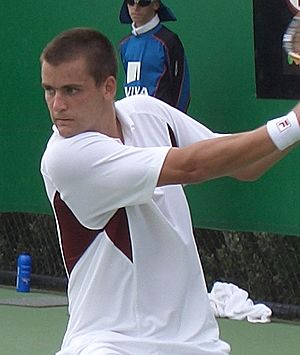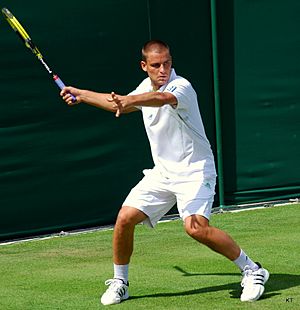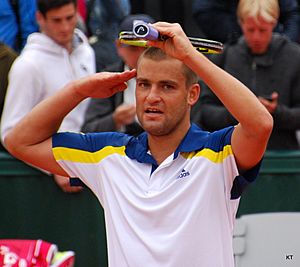Mikhail Youzhny facts for kids
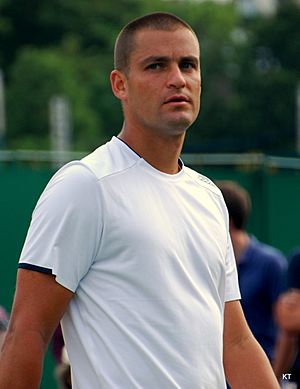
Youzhny at the 2014 Wimbledon Championships
|
|
| Country (sports) | |
|---|---|
| Residence | Moscow, Russia |
| Born | 25 June 1982 Moscow, Russian SFSR, Soviet Union |
| Height | 1.83 m (6 ft 0 in) |
| Turned pro | 1999 |
| Retired | 2018 |
| Plays | Right-handed (one-handed backhand) |
| Coach | Boris Sobkin (2000–2018) |
| Prize money | $14,264,450 |
| Singles | |
| Career record | 499–416 (54.54%) (54.5%) |
| Career titles | 10 |
| Highest ranking | No. 8 (28 January 2008) |
| Grand Slam singles results | |
| Australian Open | QF (2008) |
| French Open | QF (2010) |
| Wimbledon | QF (2012) |
| US Open | SF (2006, 2010) |
| Other tournaments | |
| Tour Finals | Alt (2010) |
| Olympic Games | QF (2004) |
| Doubles | |
| Career record | 154–193 (44.38%) (44.4%) |
| Career titles | 9 |
| Highest ranking | No. 38 (11 April 2011) |
| Grand Slam doubles results | |
| Australian Open | QF (2014) |
| French Open | 3R (2006) |
| Wimbledon | 1R (2004, 2006, 2014, 2015, 2016) |
| US Open | QF (2006) |
| Other doubles tournaments | |
| Olympic Games | 2R (2012) |
| Team competitions | |
| Davis Cup | W (2002, 2006) |
Mikhail Mikhailovich Youzhny (born June 25, 1982) is a former professional tennis player from Russia. His fans gave him the nicknames "Misha" and "Colonel." He was once ranked as the best player in Russia and among the top 10 players in the world.
Youzhny reached his highest career ranking of world No. 8 in January 2008. He made it to the quarterfinals of all four Grand Slam tournaments, which are the biggest events in tennis. He even reached the semifinals of the US Open in 2006 and 2010. In 2006, he had a big win against world No. 2 Rafael Nadal in the quarterfinals.
Throughout his career, Youzhny won 10 singles titles on the ATP Tour. He was also a key player for the Russian national team, helping them win the Davis Cup in 2002 and 2006.
Contents
Early Life and Tennis Beginnings
Mikhail Youzhny was born in Moscow. His father, Mikhail, was a colonel in the Soviet army, and his mother, Lubov, was a professional tennis player. His father gave up his army career to help Mikhail and his older brother, Andrei, become tennis players.
The family found a coach named Boris Sobkin to train the boys. To get to the Spartak Club for practice, Mikhail and Andrei had to take a long journey on a metro train and two buses. Their mother took a part-time job to help pay for their training.
Coach Sobkin remembered that Youzhny was a very emotional player when he was young. He would sometimes break his rackets and cry. But Sobkin saw a special "sparkle" in his eyes and knew he had the potential to be a great player.
Professional Career
Rising Through the Ranks (2000–2003)
Youzhny turned professional in 1999. By 2001, he made his debut in a Grand Slam tournament at the Australian Open, reaching the third round. He also reached the fourth round at his first Wimbledon.
In 2002, Youzhny won his first ATP Tour title at the Mercedes Cup in Stuttgart, Germany. Later that year, he played a very important match in the Davis Cup final. He came back from being two sets down to win the final match, giving Russia the championship.
Breakthrough Years (2004–2007)
In 2004, Youzhny won his second title at the St. Petersburg Open. He finished the year ranked No. 16 in the world.
The 2006 season was a big one for Youzhny. At the US Open, he had an amazing run to the semifinals. He defeated top players like David Ferrer and Tommy Robredo. His biggest win was against the world No. 2 player, Rafael Nadal, in the quarterfinals.
In 2007, Youzhny won the Rotterdam Open, a major tournament. He also reached the final of the Dubai Tennis Championships, where he beat Nadal again. These strong performances helped him break into the world's top 10 for the first time.
A Top 10 Player (2008–2010)
Youzhny started 2008 by winning the Chennai Open. He then reached the quarterfinals of the Australian Open, which helped him achieve his career-high ranking of world No. 8.
During a match in 2008, Youzhny became frustrated and hit his head with his racket, causing it to bleed. Even after this, he went on to win the match. This moment showed his intense and passionate character on the court.
The year 2010 was one of his best seasons. He reached five finals and won two titles. He also made it to the semifinals of the US Open for the second time. He finished the year ranked No. 10 in the world.
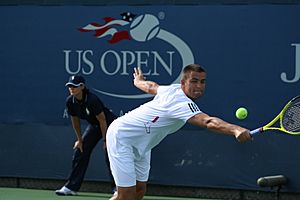
Later Career and Retirement (2011–2018)
In the following years, Youzhny continued to be a strong competitor. In 2012, he reached the quarterfinals of Wimbledon for the first time. This meant he had reached the quarterfinals of all four Grand Slam tournaments in his career.
In 2013, he won two more titles, including the Valencia Open 500, where he beat top player David Ferrer in the final. This was his 10th and final singles title.
Youzhny announced his retirement from professional tennis in 2018. His last tournament was the St. Petersburg Open, in his home country of Russia. He played his final match against Roberto Bautista Agut.
After retiring as a player, Youzhny began coaching. He worked with Canadian player Denis Shapovalov starting in 2019.
Playing Style
Youzhny was known for his powerful shots from both his forehand and backhand sides. His one-handed backhand was considered one of the best and most unique on the tour. He could hit it with great power and also use a soft, slicing shot to defend.
He was an all-court player, meaning he was comfortable playing on all surfaces like clay, grass, and hard courts. He was especially good on grass courts. Youzhny was also known for his fighting spirit and never giving up in tough matches.
After winning a match, Youzhny had a special celebration. He would give a military-style salute to the crowd by placing his racket on his head. This was a tribute to his late father, who was an army colonel.
Personal Life
Youzhny earned a PhD in philosophy from the University of Moscow in 2010. His research was about the different ways professional tennis players think and compete against each other.
He married his wife, Yulia, in 2008. They had two sons, Maxim and Igor, and a daughter, Milana. Yulia passed away in January 2024.
Images for kids
-
The Russian Davis Cup Team in 2009. From right to left: the team captain, Youzhny, Igor Andreev, Marat Safin and Igor Kunitsyn.
See also
 In Spanish: Mijaíl Yuzhny para niños
In Spanish: Mijaíl Yuzhny para niños
 | Percy Lavon Julian |
 | Katherine Johnson |
 | George Washington Carver |
 | Annie Easley |


